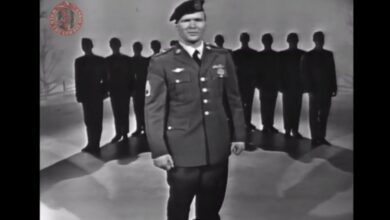Elvis pours deep emotion into this song, Priscilla shares.
Elvis Presley, widely celebrated as the “King of Rock and Roll,” holds a permanent place in the annals of music history and popular culture. He was born on January 8, 1935, in Tupelo, Mississippi, where he grew up in a humble home that emphasized music as a crucial form of expression. His musical upbringing was enriched by gospel from church, rhythm and blues from his local community, and country music, all of which contributed to the creation of his distinctive rockabilly sound. This innovative genre, which blended various influences, laid the foundation for rock and roll as we know it today. As a teenager, he began to perform locally, showcasing not just his vocal skills but also a captivating stage presence that would become a hallmark of his career.
By the mid-1950s, Elvis’s revolutionary musical style and persona caught the attention of producers and record labels, leading to his first significant record deal. With chart-topping singles such as “Heartbreak Hotel,” “Hound Dog,” and “Don’t Be Cruel,” he quickly rose to fame, enchanting audiences with his dynamic energy and charisma. His innovative approach to music and performance—characterized by powerful vocals and a flair for improvisation—enabled him to unite diverse musical genres, appealing to the youth of the time and transforming the cultural landscape. As he became a household name, his influence expanded beyond music to fashion, youth culture, and the early days of television.
Elvis’s character was marked by a profound passion for performance and an irresistible charm that resonated with fans globally. He transcended the role of a mere singer, emerging as a cultural icon who symbolized the rebellious spirit of the 1950s youth. His performances, often filled with vibrant dance moves and heartfelt singing, represented a stark departure from the more subdued entertainment styles of previous eras. His ability to forge connections with audiences, especially young people navigating their own cultural shifts, firmly established him as a groundbreaking figure in the music industry.
Despite facing challenges such as public scrutiny and the pressures of fame, Elvis continually evolved as an artist. The late 1960s marked a pivotal moment in his career with the acclaimed “68 Comeback Special.” Initially viewed as a diminishing star, this performance showcased his lasting talent and adaptability. It was during this event that Elvis rejuvenated his image, returning to live music performance after a stint in movie musicals. The comeback special was a critical triumph, reigniting his love for live shows and re-establishing a meaningful connection with his audience.
A defining moment in Elvis’s career occurred during the performance of “If I Can Dream” in the “68 Comeback Special.” Written in response to the turbulent social climate of the era, the song encapsulated the hopes and aspirations of many as the nation faced civil rights struggles and political unrest. Elvis’s heartfelt rendition communicated a message of unity and a yearning for a brighter future, showcasing not only his vocal prowess but also his capacity to articulate profound emotions and address social issues through his music.
Dressed in a striking black outfit, Elvis’s on-screen presence was captivating; he captured attention with his passionate delivery and soul-stirring performance. The orchestration, complemented by uplifting choir harmonies, enhanced the song’s message, creating a deeply resonant listening experience. His performance transcended mere entertainment, marking a significant moment in American culture and revealing the artist’s ability to address societal issues through his artistry.
Looking back, “If I Can Dream” stands as a beacon of hope, reflecting Elvis’s vision for a more harmonious world. This performance resonated beyond his own career; it echoed with an audience undergoing tremendous societal change. The song has since evolved into an anthem for understanding and peace, resonating with contemporary discussions about social justice and community.
Elvis’s legacy remains vibrant, highlighting his capacity to bridge cultural and musical divides. His use of music as a means for advocacy exemplifies the powerful role artists can play in society. Though he passed away in 1977, Elvis’s impact on future generations of musicians and the music industry as a whole remains profound. Iconic artists across genres frequently cite him as a primary influence, underscoring his far-reaching legacy.
Beyond his musical successes, Elvis’s life story reflects the complexities of fame and personal struggle. He navigated a tumultuous path defined by both exceptional success and personal challenges, including battles with addiction and health issues. Nevertheless, his commitment to his craft remained steadfast. His ability to continuously reinvent himself—whether through evolving musical styles or adapting to the changing tastes of his audience—demonstrates his resilience and creativity as an artist.
As time progresses, Elvis Presley’s music and performances continue to be rediscovered and celebrated by new audiences. He has transcended the role of a mere musician; he symbolizes transformation, creativity, and the universal power of music. Through his extensive body of work, Elvis will forever hold a significant place in music history, inspiring artists and fans alike with his timeless artistry and enduring spirit. His life and contributions serve as a poignant reminder of the profound impact one individual can have on the world, leaving a legacy that transcends generations and cultures.





